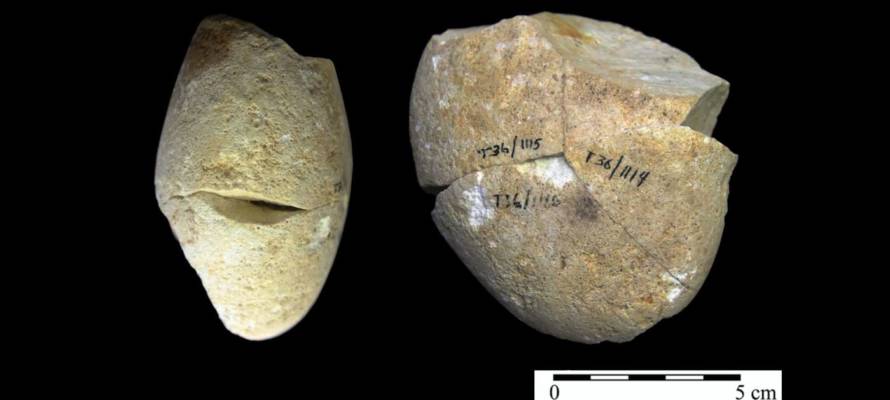Israeli researchers discovered that an artifact originally unearthed near Haifa is the earliest grinding tool found to date.
By Yakir Benzion, United With Israel
Researchers at the University of Haifa have discovered that a rock found in a cave on Mount Carmel just outside the city of Haifa may be the earliest grinding tool used by ancient ancestors.
Archaeologists analyzed an artifact found in the Tabun Cave and determined that it bore traces of mechanical alterations similar to those recorded on grinding tools, but the big discovery is that the artifact dates to the late Lower Paleolithic era from whence there have been no similar finds ever before.
The researchers sought to determine whether the traces on the artifact could be attributed to purposeful human action. They conducted a detailed use-wear analysis of the cobble and the results of their experiments showed positive results that the rock was used for “purposeful human practice.”
“Throughout the Early Pleistocene, use of stone tools was associated with vertical motions (battering, pounding, striking) or with the application of a thin or narrow working edge, leveled at cutting or scraping,” the Israeli researchers wrote in a recently published paper in the prestigious Journal of Human Evolution. “Conversely, abrading consists in applying a wide working surface in a continuous sequence of horizontal motions, geared to modify or reduce the surfaces of a targeted material.”
“The emergence of this technology joins additional behavioral changes recently identified and attributed to the Middle Pleistocene, illustrating the growing and diversifying capabilities of early hominins to harness technology to shape their environment,” the researchers wrote.
The project was led by Dr. Ron Schimmelmitz, Dr. Iris Gruman-Yaroslavsky, Prof. Mina Weinstein-Evron, and Prof. Danny Rosenberg with other partners in Israel and around the world and is based on a rock that was excavated at the site by Prof. Arthur Jelinek of the University of Arizona in the late 1960s.
When looking at the collection, Schimmelmitz noticed clear abrasion marks on one of the pebbles Jelinek found in the cave and using advanced technology in the lab at the University’s Zinman Institute of Archeology, the scientists determined the marks were man-made and not from erosion.
“While the tool is seemingly ‘simple,’ its early appearance and the fact that it has no parallel at such an early stage of human evolution give it global importance,” the researchers said.
Bring Joy to Israeli Soldiers - Send Winter Care Packages!
We are honored to thank the young men and women of the IDF who risk their lives every day to defend the citizens of Israel.
Join us in sending winter care packages and personal notes of support to Israeli soldiers who are out in the cold all day.
Warm up a soldier's heart with essential winter wear including fleece jackets, hats, gloves and more. Keep an entire unit warm!
THE SOLDIERS REALLY APPRECIATE YOUR LOVE AND CONCERN!
Click Here to Send Your Gift and Personal Note to Israeli Soldiers
Send Passover Packages to Needy Israeli Soldiers - Bring Them Joy!
We are honored to thank the young men and women of the IDF who risk their lives every day to protect the citizens of Israel. Since October 7th, soldiers have been on the battlefield for months - many are hoping to come home for Passover.
Join us in sending Passover food packages (and personal notes) to Israeli soldiers and their families.
Many soldiers spend the Passover holiday with needy families back home. The soldiers greatly appreciate your love and concern. Bring them Passover joy!
CLICK HERE TO SEND YOUR PACKAGE AND NOTE TO ISRAELI SOLDIERS!





